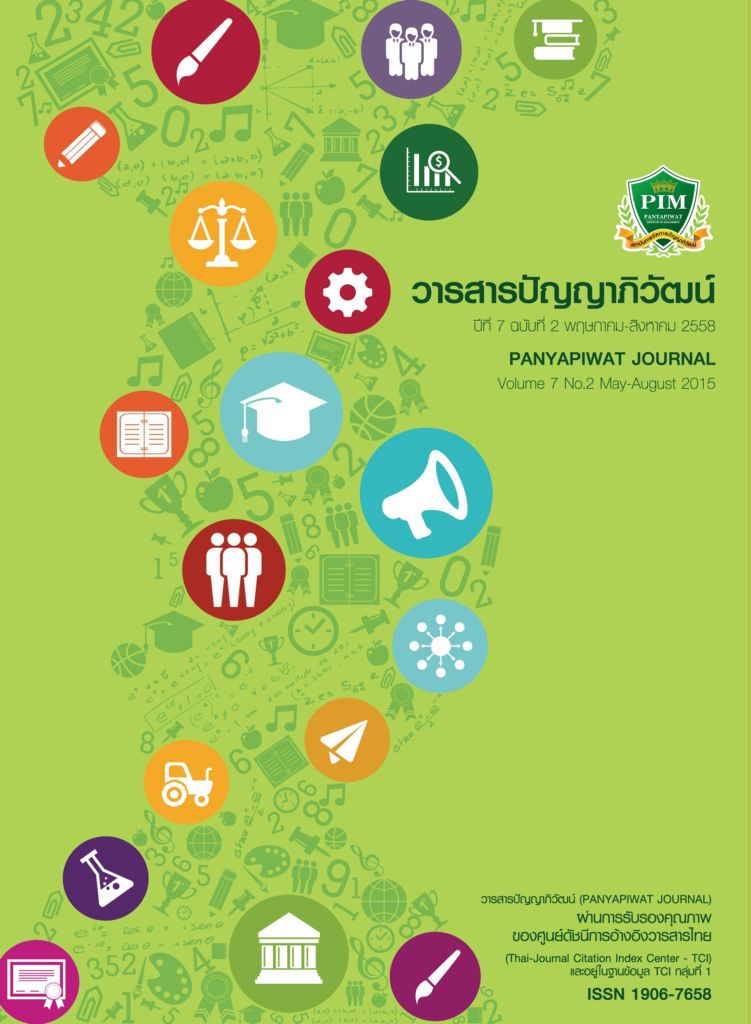ปัจจัยภาวะผู้นำการเปลี่ยนแปลง การพัฒนาทรัพยากรมนุษย์ และความพร้อมสำหรับการเปลี่ยนแปลงที่มีอิทธิพลต่อผลการ ปฏิบัติงานของบุคลากรในมหาวิทยาลัยในกำกับของรัฐ
Main Article Content
บทคัดย่อ
บทคัดย่อ
การศึกษาครั้งนี้ มีวัตถุประสงค์หลัก คือ 1) เพื่อศึกษาอิทธิพลของปัจจัยภาวะผู้นำการเปลี่ยนแปลง (ประกอบด้วย 4 ตัวแปรย่อย) การพัฒนาทรัพยากรมนุษย์ (ประกอบด้วย 5 ตัวแปรย่อย) ความพร้อมสำหรับการเปลี่ยนแปลง (ประกอบด้วย 5 ตัวแปรย่อย) ที่มีต่อผลการปฏิบัติงานของบุคลากรในมหาวิทยาลัยในกำกับของรัฐ และ 2) เพื่อศึกษารูปแบบความสัมพันธ์ระหว่างองค์ประกอบย่อยต่างๆ ในปัจจัยหลักทั้ง 3 ด้าน ที่มีต่อผลการปฏิบัติงานของบุคลากรในมหาวิทยาลัยในกำกับของรัฐ จากการวิจัย พบว่า 1) ตัวแปรย่อยเกือบทุกตัวในปัจจัยภาวะผู้นำการเปลี่ยนแปลงการพัฒนาทรัพยากรมนุษย์
และความพร้อมสำหรับการเปลี่ยนแปลง (รวม 13 ตัวแปรย่อย) ยกเว้นแต่ กิจกรรมการศึกษา (Education) มีอิทธิพลทางตรงเชิงบวกต่อผลการปฏิบัติงานของบุคลากร อย่างมีนัยสำคัญทางสถิติที่ระดับ .05 โดยการคำนึงถึงปัจเจกบุคคล (Individual Consideration) ซึ่งเป็นองค์ประกอบย่อยของปัจจัยภาวะผู้นำการเปลี่ยนแปลง มีอิทธิพลทางตรงเชิงบวกต่อผลการปฏิบัติงานของบุคลากรมากที่สุด และ 2) ปัจจัยภาวะผู้นำการเปลี่ยนแปลง และการพัฒนาทรัพยากรมนุษย์มีทั้งอิทธิพลทางตรงและทางอ้อมเชิงบวกต่อผลการปฏิบัติงานของบุคลากรผ่านทางปัจจัยความพร้อมสำหรับการเปลี่ยนแปลงโดยปัจจัยหลักทั้ง 3 ด้าน ซึ่งประกอบด้วยตัวแปรอิสระ 14 ตัวแปรย่อย สามารถอธิบายความผันแปรของผลการปฏิบัติงานของบุคลากรในมหาวิทยาลัยในกำกับของรัฐได้ร้อยละ 72.9 (R2 = 0.729) จึงกล่าวได้ว่าปัจจัยหลักทั้ง 3 ปัจจัยที่ศึกษา มีอิทธิพลต่อผลการปฏิบัติงานของบุคลากรในระดับสูง
Abstract
The major purposes of this research were 1) to investigate both direct and indirect influences of transformational leadership, human resource development, and readiness for change factors on job performance of employee 2) to study relationship among these four key variables. Multi-stage sampling method was used to acquire the samples. The samples of 334 out of 400 sampling from full-time employees in 12 Thai autonomous universities were completely collected by using closed-end questionnaire.
The research results indicated that 1) Most of sub-factors of transformational leadership, human resource development, and readiness for change, except education, directly influenced job performance of
employees. Individual consideration, which is sub-factors of transformational leadership, had the highest direct positively influence on employees’ job performance and 2) Transformational leadership and human resource development factors had both positively direct and indirect influence on employees’ job performance through a mediating function of readiness for change factors. This proposed conceptual model could explain 72.9 percent (R2 = 0.729) of employees’ job performance in Thai autonomous universities.
Article Details
“ข้าพเจ้าและผู้เขียนร่วม (ถ้ามี) ขอรับรองว่า บทความที่เสนอมานี้ยังไม่เคยได้รับการตีพิมพ์และไม่ได้อยู่ระหว่างกระบวนการพิจารณาลงตีพิมพ์ในวารสารหรือแหล่งเผยแพร่อื่นใด ข้าพเจ้าและผู้เขียนร่วมยอมรับหลักเกณฑ์การพิจารณาต้นฉบับ ทั้งยินยอมให้กองบรรณาธิการมีสิทธิ์พิจารณาและตรวจแก้ต้นฉบับได้ตามที่เห็นสมควร พร้อมนี้ขอมอบลิขสิทธิ์บทความที่ได้รับการตีพิมพ์ให้แก่สถาบันการจัดการปัญญาภิวัฒน์หากมีการฟ้องร้องเรื่องการละเมิดลิขสิทธิ์เกี่ยวกับภาพ กราฟ ข้อความส่วนใดส่วนหนึ่งและ/หรือข้อคิดเห็นที่ปรากฏในบทความข้าพเจ้าและผู้เขียนร่วมยินยอมรับผิดชอบแต่เพียงฝ่ายเดียว”
เอกสารอ้างอิง
สำนักงานรับรองมาตรฐานและประเมินคุณภาพการศึกษา. (2556).รายงานผลการประเมินคุณภาพการศึกษาภายนอกปีพ.ศ. 2555: ระดับอุดมศึกษา. สืบค้นเมื่อ 4 พฤษภาคม 2556, จาก http://www.onesqa.or.th/onesqa/th/Report/unversity.php
Armenakis, A., Bernerth, J., Pitts, J. & Walker, H. (2007). Organizational change recipients’ beliefs scale. The Journal of Applied Behavioral Science, 43(4), 481-503.
Armenakis, A. & Harris, S. (2002). Crafting a change message to create transformational readiness. Journal of Organizational Change Management, 15(2), 169–183.
Armstrong, M. (2006).Strategic Human Resource Management: A Guide to Action. (3rd ed.). Philadelphia: Kogan Page.
Avolio, B. J. & Bass, B. M. (2004).Multifactor Leadership Questionnaire: Third Edition Manual. New York: Mind Garden INC.
Bass, B. M. & Avolio, B. J. (1994). Improving Organizational Effectiveness through Transformational Leadership. Thousand Oaks: SAGE Publication
Beer, M. (2010). Managing Change and Transition. Boston: Harvard Business School.
Gilley, J. W., Eggland, S. A. &.Maycunich, A. M. (2002).Principle of Human Resource Development. Cambridge: Perseus.
Kotter, J. P. & Cohen, D. S. (2002). The Heart of Change. Boston: Harvard Business School.
Lawler, E. E. & Worley, C. G. (2006). Built to Change. New York: John Wiley & Sons.
Madsen, S., John, C. & Miller, D. (2007). Influential factors in individual Readiness for change.Journal of Businessand Management, 12(2), 93-110.
Miller, B. P. (2001).Leadership, Organizational Culture, and Managing Change. Doctoral Dissertation, North Carolina University.
Mondy, R. W. (2009). Human Resource Management. Upper Saddle River, New York: Prentice Hall.
Nadler, L. (1994). The Handbook of Human Resource Development. New York: Wiley & Son.
Noe, R. A. (2008). Employee Training and Development. New York: McGraw-Hill.
Northouse, P. G. (2007). Leadership: Theory and Practice. Thousand Oaks: SAGE Publication.
Pace, R. W., Smith, P. C. & Mills, G. E. (1991).Human Resource Development: The Field. Upper Saddle River, NJ: Prentice Hall.
Pellettiere, V. (2006). Organizational Self-assessment to Determine the Readiness and Risk for a Planned Change.Organizational Development Journal, 24, 38-43.
Rotundo, M. & Sackett, P. R. (2002). The Relative Importance of Task, Citizenship, and Counter-Productive Performance to Global ratings. Journal of Applied Psychology, 87, 66-88.
Smith, I. (2005). Achieving Readiness for Organizational Change. Library Management, 26(6), 408-412.
Yorks, L. (2005). Strategic Human Resource Development. New York: Thomson Press.
Translated Thai References
Office for National Education Standards and Quality Assessment: ONESQA. (2012). External Committee’s QualityAssessment Report: Higher Education Institutes. Retrieved May 4, 2013, from http://www.onesqa.or.th/university.php [in Thai].


